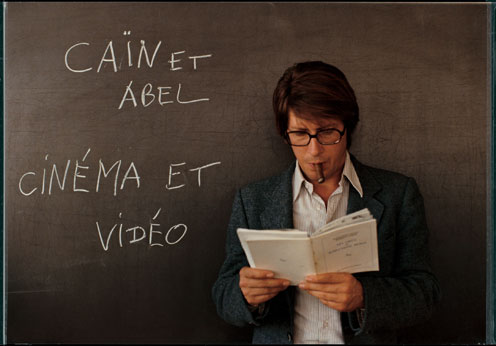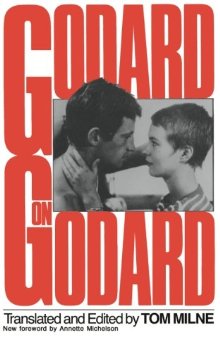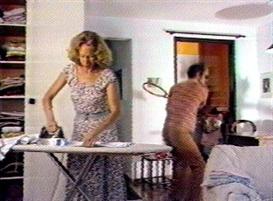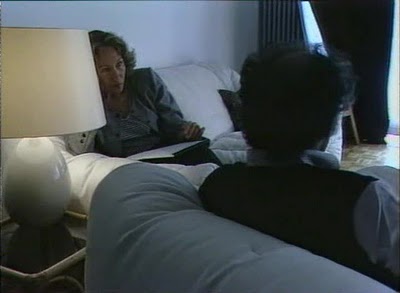From The Soho News, September 24-30, 1980. Their title (not mine) was “Bringing Godard Back Home”. This is the first of two interviews that I’ve had with Godard to date; the other one, 16 years later, can be found here. — J.R.

Jean-Luc Godard seems to be into transportation metaphors a lot nowadays. It’s been rumored that when Paul Schrader sidled up to him recently at a film festival and said, “I think you should know that I took something of yours from The Married Woman and put it in American Gigolo,” the Master coolly replied, “What’s important isn’t what you take — it’s where you take it to.”
Every Man for Himself, Godard’s first movie to open in America and show at the New York Film Festival in eight years, is first of all a vehicle designed to bring him back to us. It has all the ingredients that mainstream critics have been clamoring for: stars (Isabelle Huppert, Jacques Dutronc), clearly defined characters and plot, lush music, beautiful 35mm photography, flaky eroticism, humor. “I’m really making my landing on the earth of story,” Godard tells me at one point. “Like a plane.”
Can it be sheer coincidence that he seems to take up prostitution as a theme only when he’s working in 35mm? Read more
From the Summer 1972 issue of Sight and Sound. This was my first contribution to that magazine. — J.R.

Godard’s collected criticism (1) is many things at once: informal history (1950–1967) of the arts in general and film in particular, spiritual and intellectual autobiography, a theory of aesthetics, a grab bag of puns. For those who read the pieces when they first appeared — chiefly in the yellow-covered Cahiers du Cinéma and the newspaper format of Arts — it was frequently ill-mannered gibberish that began to be vindicated (or amplified) when the films followed, retrospectively becoming a form of prophecy:
Each shot of MAN OF THE WEST gives one the impression that Anthony Mann is reinventing the Western, exactly as Matisse’s portraits reinvent the features of Piero della Francesca . . . in other words, he both shows and demonstrates, innovates and copies, criticizes and creates.
For those who encounter the films first, it is likely to seem like an anthology of footnotes serving to decipher and augment what may have once seemed like ill-mannered gibberish on the screen. But for those more interested in continuity than cause and effect, it rounds out a seventeen-year body of work — from an article on Joseph Mankiewicz in Gazette du Cinéma to the “Fin du Cinéma” title concluding WEEKEND — that has already transformed much of the vocabulary and syntax of modern narrative film, further illustrating a style that has passed from avant-garde to neoclassical in less than a decade. Read more
From the Chicago Reader (November 17, 1995). — J.R.
Soft and Hard (A Soft Conversation Between Two Friends on a Hard Subject)
**** (Masterpiece)
Directed and written by Anne-Marie Miéville and Jean-Luc Godard
With Godard and Miéville.

A 48-minute video that’s premiering in Chicago ten years after it was made, Jean-Luc Godard and Anne-Marie Miéville’s Soft and Hard (A Soft Conversation Between Two Friends on a Hard Subject) is so far in advance of most films and videos made today about the essential properties of both media that it makes not so much Chicago but contemporary Western culture feel like an intellectual backwater. It was commissioned by and originally broadcast on England’s Channel Four, and although most of Godard and Miéville’s talk is in French and subtitled, the funding source is acknowledged in several ways: by the video’s English title, by English intertitles throughout, by many stills from Hollywood pictures (including Frankenstein, Scarface, Rear Window, and the 1948 Joan of Arc) employed as punctuation, by an early sequence of Godard speaking in English on the phone about business arrangements for his film King Lear, and by a brief but moving exchange in English between Godard and Miéville that concludes the work. Read more




